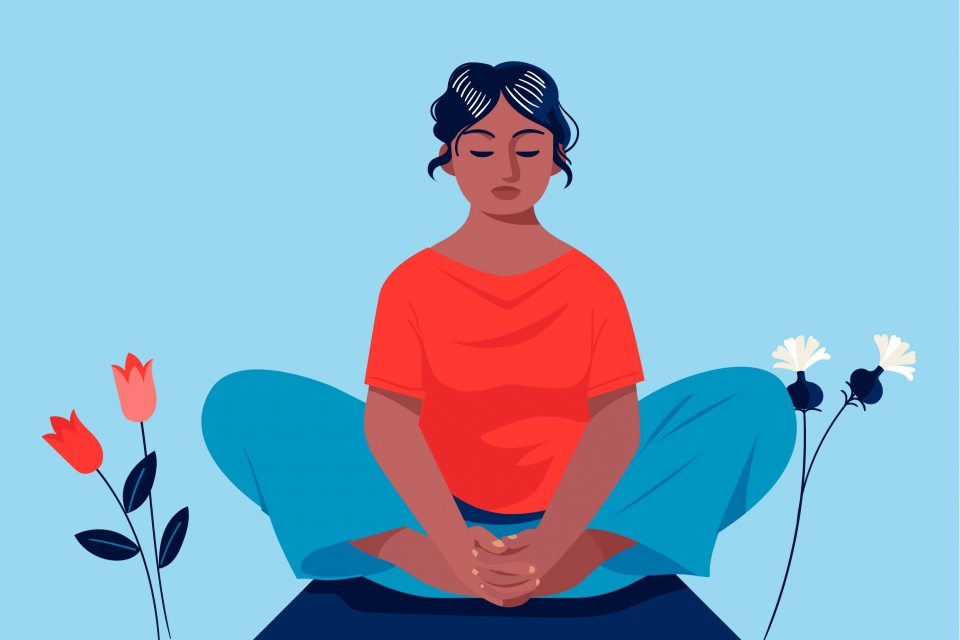How to calm yourself down when you feel overwhelmed: grounding and relaxation techniques
Recollection of traumatic events can trigger intense emotional reactions in survivors, such as feeling dizzy, difficulties breathing, rapid heartrate and fainting. In their different forms and levels of intensity, trauma-related symptoms can be quite overwhelming. In this case, two main actions should be taken: grounding, which means to bring yourself back to the present moment and relaxation, which means to calm yourself down. Please see below some tips to best handle such reactions in practice.
Breathing. When we are anxious or upset our breathing becomes rapid and shallow. We can feel better by deliberately slowing and relaxing our breathing. Anxious breathing is up in the chest, whereas relaxed breathing happens deeper in the belly. Follow the instructions for a relaxed breathing:
- Breathe in slowly and steadily through your nose for a count of 4 - don’t rush this!
- Pause for a count of 1. Exhale slowly and steadily for a count of 6 - breathe out gradually - try not to breathe out with a sigh.
- Repeat for a few minutes until you notice a change in how your body feels.
- If you get distracted, or if your mind wanders, just bring your attention back to how it feels to breathe in and out.
Smell. Smells are an incredibly powerful way of coming to our senses. If you are deliberately paying attention to a smell, you are truly in the present moment. Try and smell something that has positive associations for you – maybe one that reminds you of happy times, or a smell which you enjoy. Carry it with you and use it to bring yourself back to the present moment if you get caught up in an unwanted memory. Helpful smells:
- Small bottles of essential oils - e.g., eucalyptus, mint, lavender, lemon.
- Small, dried ‑flowers such as lavender.
- Perfume soaked on a tissue.
- Whole spices from the kitchen.
Touch. The sensation of touch has proven helpful in calming the body and managing overwhelming emotions. Below are some suggestions to try for a short while to help you to distract from what you’re experiencing and refocus on what’s happening in the present moment:
- Place your hands on a nearby surface such as a table, book or other object and notice the connection between your hands and the object and what it feels like
- Take a piece of clothing and concentrate on what it feels like, pay attention to the textures
- Feel the pressure of your back on the seat and notice the sensation as you ease into the chair
Move. Movement of the body can be helpful for improved wellbeing and relaxation when you’re feeling emotionally overwhelmed. You can start by taking a walk or a few steps while paying attention to how your body feels with each movement. For example, when your feet touch the floor or when you move your arms and joints, notice the feeling, and any changes in your heart rate and mood.
Muscles relaxation/Body Scan. When we are stressed, we tend to tense up and contract our muscles, without even realizing it. By paying attention to our body and how it feels when we are anxious or upset, we can progressively learn how to relax and feel better. Basic instructions: Can include here how to do the body scan…
Grounding statements. Unwanted memories such as flashbacks can make us mentally ‘time travel’ back to the trauma, and we can sometimes forget that we are safe in the present. It can be helpful to write a ‘grounding statement’ to remind yourself that you are safe now, for example “My name is...., I am...(location) and I am safe now”.
For more information, please visit
DETACHING FROM EMOTIONAL PAIN (GROUNDING) (wordpress.com)
https://www.who.int/publications/i/item/9789240003927


